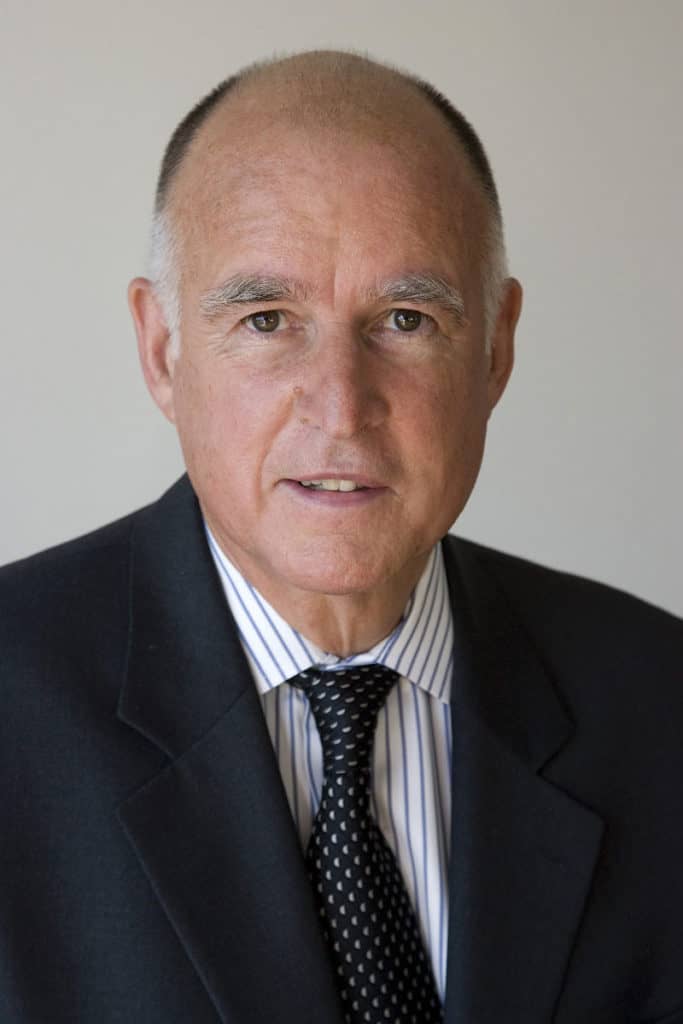California Sanctuary Surge
Lloyd Billingsley, Front Page Mag, April 17, 2017

California Governor Jerry Brown
California governor Jerry Brown has pardoned “three veterans deported to Mexico,” as the Sacramento Bee reported. Hector Barajas Varela, who came to the United States “without authorization,” served more than year in prison for shooting at an occupied home. Brown also pardoned Erasmo Apodaca, who served 10 months in prison for burglary, and Marco Chavez, who spent 15 months in prison for reasons the report did not specify.
Brown issued the pardons as Easter approached, and shortly after President Donald Trump authorized more than $500 million in emergency relief for California, including $274 million for the damaged spillway on Oroville Dam. That federal largesse, after Brown’s tsumani of anti-Trump rhetoric, did not alter the governor’s determination to reinforce California as a sanctuary state for violent criminals. His pardon of criminal foreign nationals, after they had been deported, is merely the latest wave in the surge.
Major California cities and counties have long defied federal efforts to arrest and deport illegals, even violent criminals. Now San Francisco is appealing to a federal judge to block the Trump administration from withholding federal funds from such cities.
When repeatedly deported felon Juan Francisco Lopez-Sanchez gunned down Kate Steinle on a San Francisco pier in July, 2015, that deadly act of gun violence had no discernable effect on Tani Cantil-Sakauye, Chief Justice of the California Supreme Court, headquartered in San Francisco. The state’s Chief Justice, who like Brown has sworn to uphold the law, reserves her wrath for “meanspirited” ICE agents, whom she accused of “stalking” illegals in courthouses. As attorney general Jeff Sessions, explained, it is entirely legal and proper for federal agents to make arrests in public places.
Had Mexican national Luis Bracamontes been arrested, deported and not allowed to return, he might not have gunned down Sacramento County sheriff’s deputy Danny Oliver and detective Michael Davis in 2014. Even so, illegals in the region claimed to fear ICE agents, so this year Sacramento County sheriff Scott Jones invited ICE director Thomas Homan to explain how the federal agency aims to enforce the law.
Hermandad Mexicana, founded by the late Stalinist Bert Corona, organized a demonstration proclaiming “resiste.” Local Democrats denounced, “discriminatory efforts to divide families” and “hate-filled attacks against immigrants.”
After the election of Donald Trump, California attorney general Xavier Becerra proclaimed: “If you want to take on a forward-leaning state that is prepared to defend its rights and interests, then come at us.” For the task of defending “unauthorized immigrants,” Becerra is well qualified.
At Stanford, where he earned his bachelor and law degrees, Becerra was a member of MEChA, the Movimiento Estudiantil Chicano De Aztlan. A belch from the sixties’ left, MEChA calls the southwest portion of the United States “Aztlan” and seeks to regain the territory for Mexico.
In Congress, the MEChA veteran faithfully supported amnesty for those in the country illegally. Though turned down as a running mate for Hillary Clinton, Becerra is the ideal choice for Jerry Brown’s attorney general, and he remains uncritical of sanctuary cities that shelter violent criminals.
For his part, Brown began harboring violent criminals back in the 1970s. American Indian Movement co-founder Dennis Banks, convicted of riot and assault for a courthouse gun battle in South Dakota, fled to California and governor Jerry Brown refused to extradite him. That set the tone for Brown’s second go-round as governor.
In late 2015, after radical Islamic terrorists Syeed Farook and Tashfeen Malik gunned down 14 people in San Bernardino, Brown said “we have to be on guard and we have to do whatever we can do.” Brown also said he would spend time “making sure that our federal-state collaboration really is working.” The governor did just the opposite, actively opposing federal enforcement of U.S. immigration laws and his motives are stronger than Xavier Becerra’s.
Three times Jerry Brown ran for President of the United States and three times he failed, with good reason. The partisan Democrat appointed unqualified ideologue Rose Bird as Chief Justice of the state Supreme Court, and the people booted her out, also tossing Brown’s court picks Joseph Grodin and Cruz Reynoso.
Brown’s pick for Health and Welfare secretary was Mario Obledo, an open-border advocate and co-founder of the California La Raza Lawyers Association. In 1998, Obledo announced that “California is going to be a Hispanic state and anyone who doesn’t like it should leave.”
President Trump, by contrast, wants those who entered the nation illegally to leave and he seeks to deport the violent criminal illegals the governor of California seeks to protect. So no surprise that the election of Donald Trump would send three-time loser Jerry Brown into a reactionary rage.
Jerry Brown’s Easter pardon of three criminal foreign nationals is the governor’s attempt to appear presidential in the twilight of his career. On the other hand, the pardons are redundant. All government indulgence of illegals is in effect a pardon for those who violated U.S. immigration laws.
As attorney general Jeff Sessions explained over the weekend, what sanctuary cities are doing “makes no sense” and “we’re going to battle them every step of the way.”















